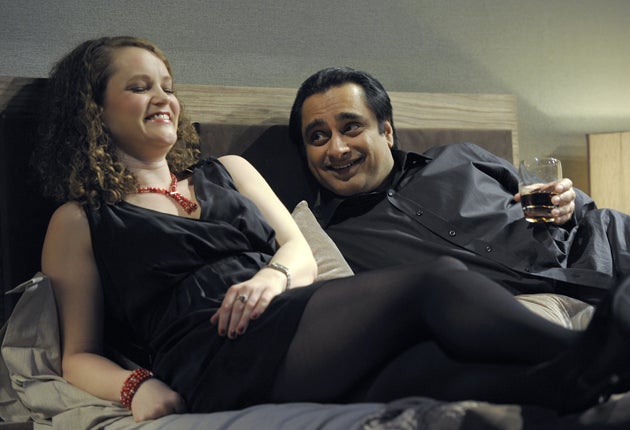Dumb Show, Rose Theatre, Kingston
Celebrity satire lacks real bite

Your support helps us to tell the story
From reproductive rights to climate change to Big Tech, The Independent is on the ground when the story is developing. Whether it's investigating the financials of Elon Musk's pro-Trump PAC or producing our latest documentary, 'The A Word', which shines a light on the American women fighting for reproductive rights, we know how important it is to parse out the facts from the messaging.
At such a critical moment in US history, we need reporters on the ground. Your donation allows us to keep sending journalists to speak to both sides of the story.
The Independent is trusted by Americans across the entire political spectrum. And unlike many other quality news outlets, we choose not to lock Americans out of our reporting and analysis with paywalls. We believe quality journalism should be available to everyone, paid for by those who can afford it.
Your support makes all the difference.From topical to trite is a short step but a fatal one.
In the six years since the premiere of Joe Penhall's play, celebrities have become even more like the servants in Villiers de l'Isle-Adam's poem Axel who "do our living for us." On the way to the theatre, I read about a new device that, for less than £2, allows proles to see where their gods have just eaten so they can visit their restaurants and "book the same table". But when vicarious hedonism turns into envy, it demands vicarious moralising, so the press, as we have often seen, incites its readers to stone the celebrity on his fall from grace and sometimes gives him a push. The TV star of Dumb Show and the two tabloid reporters who lure him into disgracing himself are figures now so familiar to us that the play lacks whatever shock and bite it may once have had.
A lack of sharpness and surprise in the writing is compounded by Stephen Unwin's lacklustre production. At the beginning it appears to be aiming at a poetically heightened reality in the eerily chiming blandishments of Emma Cunniffe's Liz and Dexter Fletcher's Greg, who, pretending to be bankers, woo Sanjeev Bhaskar's Barry. But the chilliness and menace soon wear off, and the performances, like the play, turn into a series of pulled punches. Bhaskar, in particular, is an odd choice for the charismatic comic, "Mr. Saturday Night", a role in which one expects a loose-limbed, endlessly inquisitive, repulsive-yet-mesmerising charmer with an unpredictability that at times veers excitingly close to danger. In Bhaskar, however, we get, instead of a Michael Barrymore on speed, a dead-eyed, surly Peter Sellers. When his Barry realises the trick that has been played on him, one expects an explosion of rage and panic; Bhaskar's reaction is less suggestive of infamy than indigestion.
Dexter Fletcher's floppy-haired faux-bonhomie is more entertaining, as is his transformation from corporate poodle to tabloid terrier. But Emma Cunniffe lacks the hard glamour of the type of woman who would be used as bait in such a sting, and her character is not convincing as a heartless minx coolly taking aim at the comic from her redoubt of institutional smugness. Both the reporters and their scheme have a casual, amateurish air, unlike the fast-talking ones of real life, who are so sensitive to the smell of blood you can almost see their nostrils quiver and hear them whine. When Liz praises the comic with "Excellent! That's really... you know...", the line satirises mindless hero-worship but the character just sounds inept. Nor do Barry's misdeeds seem very shocking – drunk and supposedly showing us his dark side, he sourly complains about his boring fans, feebly puts his arms around Liz, and, rebuffed, buries his nose in some happy dust. The blindingly flashing lights with which Unwin begins each new scene might be commenting on the play's contrasting lack of excitement.
To 17 April (0871 230 1552)
Join our commenting forum
Join thought-provoking conversations, follow other Independent readers and see their replies
Comments